 Petzlover
Petzlover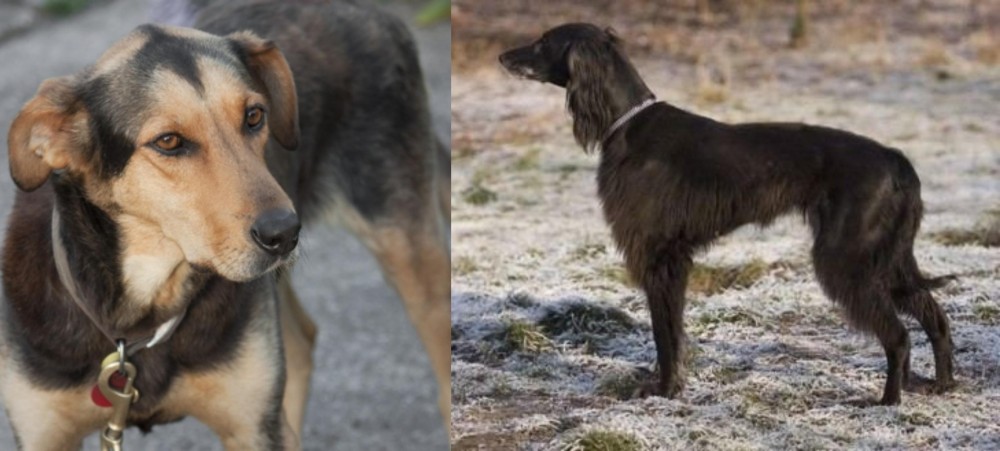 Huntaway is originated from New Zealand but Taigan is originated from Kyrgyzstan. Huntaway may grow 16 cm / 6 inches shorter than Taigan. Huntaway may weigh 12 kg / 27 pounds more than Taigan. Both Huntaway and Taigan has almost same life span. Both Huntaway and Taigan has almost same litter size. Both Huntaway and Taigan requires Low Maintenance.
Huntaway is originated from New Zealand but Taigan is originated from Kyrgyzstan. Huntaway may grow 16 cm / 6 inches shorter than Taigan. Huntaway may weigh 12 kg / 27 pounds more than Taigan. Both Huntaway and Taigan has almost same life span. Both Huntaway and Taigan has almost same litter size. Both Huntaway and Taigan requires Low Maintenance.
 The Huntaway or New Zealand Huntaway is a herding dog that originated in the New Zealand sheep country. Their main purpose is to drive sheep and they are not an old breed. They were developed late in the 19th century for their working skills. The only real criteria was that they were black and tan. A dog must win a trial in order to be placed in the New Zealand Sheep Dog Trial Association studbook. They drive sheep mainly through their deep, loud voice.
The Huntaway or New Zealand Huntaway is a herding dog that originated in the New Zealand sheep country. Their main purpose is to drive sheep and they are not an old breed. They were developed late in the 19th century for their working skills. The only real criteria was that they were black and tan. A dog must win a trial in order to be placed in the New Zealand Sheep Dog Trial Association studbook. They drive sheep mainly through their deep, loud voice.
In the New Zealand high country there was a need for a working dog with stamina, agility and intelligence to work the sheep as a drover (herder). The dog had to be able to handle rough, steep land and work with very large groups of sheep. The sheer area of land that the sheep graze and the dog would have to cover, demanded that this dog have stamina and strength to cover large pasture land and work for days if necessary. Before this the shepherds had used British sheepdogs but they preferred dogs that barked while working. So they bred the British Sheepdogs with Collies, Border Collies, Labrador, Rottweiler, Doberman and other barking sheepdogs to create the Huntaway. In addition to the bark, they bred for stamina and size.
They were participating in field trails in 1870 and ads for them were seen in newspapers by 1884. They became a separate breed in the 20th century. Today they are spreading around the world and are becoming very popular. It is not recommended that they be kept as pets however, since they are true working dogs.
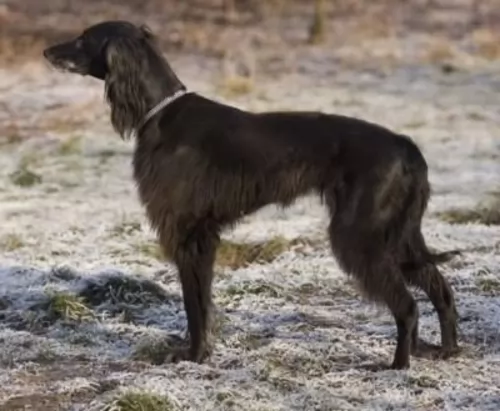 Known also as the Kyrgyzdyn Taighany, the Taigan is a sighthound dog from Kyrgyzstan. Today the dog is recognized by a number of kennel clubs,and more recently by the FCI.
Known also as the Kyrgyzdyn Taighany, the Taigan is a sighthound dog from Kyrgyzstan. Today the dog is recognized by a number of kennel clubs,and more recently by the FCI.
It was after 1991, when Kyrgyzstan became independent, that the role of the dog changed and t became a working dog again.
It was about in 1995 that a new breed standard was adopted, and since 2005 a national kennel club has existed in Kyrgyzstan.
 The Huntaway is a large dog with a deep chest and a black and tan coat. They are strong, big and muscular with voices to match. They herd, head, work the sheep in pastures and force them into pens. They are bred to have that big authoritative, deep bark. They do not yap. Their bodies are well proportioned but longer than high. They have well - padded feet and a deep chest for stamina, along with strong legs and body that allows them to run fast and change directions at will.
The Huntaway is a large dog with a deep chest and a black and tan coat. They are strong, big and muscular with voices to match. They herd, head, work the sheep in pastures and force them into pens. They are bred to have that big authoritative, deep bark. They do not yap. Their bodies are well proportioned but longer than high. They have well - padded feet and a deep chest for stamina, along with strong legs and body that allows them to run fast and change directions at will.
The tail of a Huntaway if long, while their heads are shaped like blocks while the muzzle is long and the nose is black. They have dark, round eyes and long ears. An unusually attractive dog, they have dense fur with fringe on the tail and chest. There is characteristics a very large variety in the in the way the breed looks from one dog to the next. Thus they do not participate in confirmation events, as the standard is based on working characteristics rather than appearance guidelines. They are more a “class” than a “breed”.
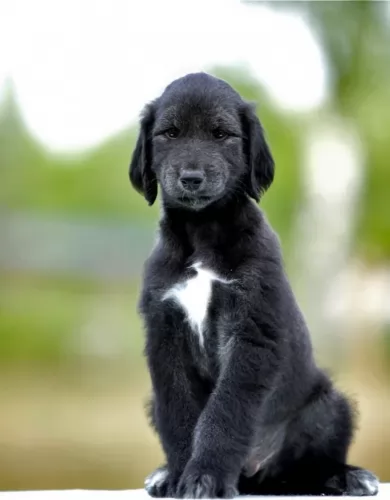 The Taigan is a large dog, looking much like a Grehound. He stands at between 55 and 82cm in height and weighs about 25 - 34kg.
The Taigan is a large dog, looking much like a Grehound. He stands at between 55 and 82cm in height and weighs about 25 - 34kg.
He has that typical slender body and slender head of the greyhound. The coat of the dog is medium length and somewhat curly and can be many colours, sometimes even bi-colored – cream, black and white, brown, grey or yellow.
During the Winter the coat can become long and thick. The ears are floppy and covered with wavy fur. The tail is long and a distinguishing mark of the dog is the way the end of the tail coils up into a ring.
These dogs can’t be kept in small city properties – they are used to wide open spaces.
An intelligent breed, the Taigan will readily learn some basic commands to make him well mannered and obedient. He is strong willed and independent, so it will be beneficial to have him trained.
He also makes a good watchdog. He is an even-tempered dog and he enjoys human companionship although he is somewhat reserved with strangers. Even so, he will still need a strong, firm owner as he is strong-willed and independent and likes to go his own way.
He is able to get along well with children in the home and other pets. Being a fairly large dog, and one that likes to run, he is better suited to large properties in the countryside as opposed to living in the city.
 The Huntaway is a pretty healthy breed, developed as it was from the sheepdogs and collies. They still face some inherited issues such as:
The Huntaway is a pretty healthy breed, developed as it was from the sheepdogs and collies. They still face some inherited issues such as:
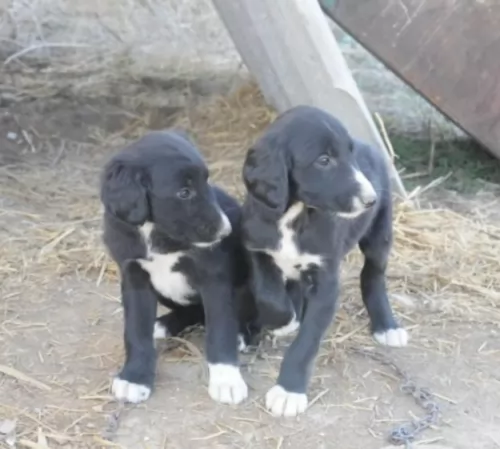 Any dog, no matter how healthy they may appear to be, can encounter any one of the many common dog illnesses there are. It is highly unlikely that your Taigan will experience these health issues but it’s good to be aware of some of them -
Any dog, no matter how healthy they may appear to be, can encounter any one of the many common dog illnesses there are. It is highly unlikely that your Taigan will experience these health issues but it’s good to be aware of some of them -
Also known as osteosarcoma, bone cancer is more commonly seen in large dogs of any breed. It’s a cancer which spreads rapidly through the body and it is terribly sad that the prognosis for your dog is poor.
You might notice swelling, joint pain and lameness and your dog will appear to always be tired. Sometimes you might see a growth. Your vet might do x-rays and if you catch it early, you can give your pet a longer lease on life.
 If you are not using your Huntaway to herd, then feed a medium formula not a high protein, high calorie formula. Feed 3-4 times a day and 1-2 cups.
If you are not using your Huntaway to herd, then feed a medium formula not a high protein, high calorie formula. Feed 3-4 times a day and 1-2 cups.
3 cups per day feeding twice a day high quality medium calorie food.
Exceptional stamina
This herding breed has a great need of mental and physical stimulation. They were born to herd and to do so over vast tracts of land in challenging conditions. They need to be challenged. They need daily exercise at a very high level. A Run them every day or take them on a couple of long walks. They will excel in field trials, Barnhunt, agility and rescue. They love to learn.
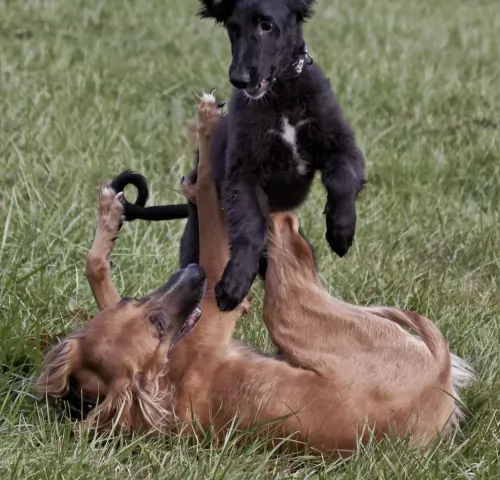 If you feed him one of the commercially manufactured dog foods, make sure its for a large, active dog breed and that it has a good list of ingredients. There are bad packaged dog foods and you want to avoid these. They are devoid of vitamins and minerals.
If you feed him one of the commercially manufactured dog foods, make sure its for a large, active dog breed and that it has a good list of ingredients. There are bad packaged dog foods and you want to avoid these. They are devoid of vitamins and minerals.
Read the packaging to see how much food to give. Also try and give your dog some home-made food too. Make sure it isn’t spicy, exotic foods. Stick to simple, wholesome foods such as boiled chicken, brown rice or pasta, sweet potatoes, spinach and carrots. Chop the food up and mix it into the dry kibble twice a week or so as a treat.